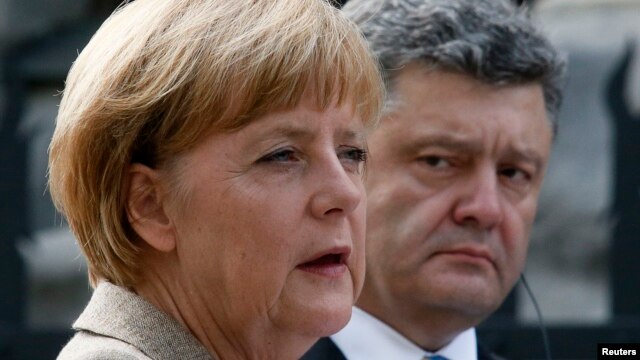Merkel calls for cease-fire in Ukraine
| Publisher | Radio Free Europe/Radio Liberty |
| Publication Date | 23 August 2014 |
| Cite as | Radio Free Europe/Radio Liberty, Merkel calls for cease-fire in Ukraine, 23 August 2014, available at: https://www.refworld.org/docid/54003f60f.html [accessed 28 May 2023] |
| Disclaimer | This is not a UNHCR publication. UNHCR is not responsible for, nor does it necessarily endorse, its content. Any views expressed are solely those of the author or publisher and do not necessarily reflect those of UNHCR, the United Nations or its Member States. |
August 23, 2014
By RFE/RL
 Germany's Chancellor Angela Merkel speaks during a news conference with Ukraine's President Petro Poroshenko in Kyiv.
Germany's Chancellor Angela Merkel speaks during a news conference with Ukraine's President Petro Poroshenko in Kyiv.
German Chancellor Angela Merkel has called for all parties involved in the hostilities in eastern Ukraine to agree to a cease-fire during a visit to Kyiv on August 23.
Speaking after talks with Ukrainian President Petro Poroshenko, Merkel said peace was possible if "both sides" engage.
She added: "there must be two sides to be successful. You cannot achieve peace on your own. I hope the talks with Russia will lead to success," referring to the scheduled meeting of leaders from Russia, Ukraine, Kazakhstan, Belarus, and EU officials on August 26 in Minsk.
Poroshenko said he was ready to work with Europe to bring an end to hostilities in the eastern part of the country and added peace would be easily be attainable if armed separatists and "foreign mercenaries" were removed.
Poroshenko said the "time has come for peace in Donbas," but he cautioned that while "Ukraine, along with our European partners and the whole world, will do everything for this to happen," peace would not come "at the expense of the sovereignty, territorial integrity, and independence of Ukraine."
Merkel stated that Germany supports the "territorial integrity" of Ukraine, including Crimea.
"It is not forgotten," Merkel said referring to Russia's illegal annexation of Crimea in March.
EU Agreement
Poroshenko announced he would call on his country's parliament in September to ratify a political association agreement with the European Union.
The decision of Poroshenko's predecessor, Viktor Yanukovych, to forego signing that agreement and work on closer ties with Russia was the catalyst that caused the Euromaidan protests and eventually led to the current situation in eastern Ukraine.
Poroshenko announced Merkel had pledged that Berlin will provide some 500 million euros (about $650 million) to help rebuild Ukraine's war-torn eastern regions.
Merkel said an additional 25 million euros would be used to help refugees from the conflict.
Merkel also said new sanctions against Russia could not be ruled out but she made clear there were currently no discussions about imposing new penalties on Moscow.
Merkel and other leaders, including U.S. President Barack Obama, harshly criticized Russia for sending hundreds of trucks carrying humanitarian aid into conflict areas in eastern Ukraine without Kyiv's permission on August 22.
Most and possibly all of those vehicles had reportedly left Ukraine one day later after unloading their cargo in separatist-held regions.
Kyiv called the move by Russia an "invasion."
Paul Picard, the acting head of the Organization for Security and Cooperation in Europe's (OSCE) monitoring group at the Donetsk-Izvarino border crossing, said on August 23 the return of the convoy "is complete."
But Ukrainian officials said by midday on August 23 that not all of the trucks had returned to Russian territory.
Based on reporting by Reuters, AP, dpa, Interfax
Link to original story on RFE/RL website
